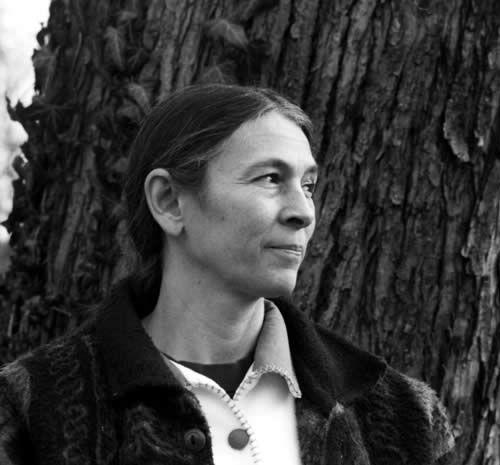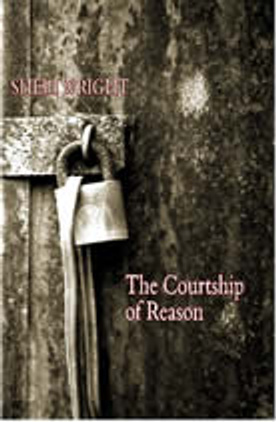Katerina Stoykova-Klemer’s interview with poet Sheri Wright

Sheri L. Wright is the author of four books of poetry, Sharks Never Sleep, Nuns Shooting Guns, Contains Scenes of Indigenous Nudity and The Courtship of Reason, (2010). Her work has been published in journals across the country, including Out of Line, Clarke Street Review and Earth’s Daughters. She has also been a guest on Accents-a radio show for literature, art and culture and has read extensively throughout the Ky./In. area. Her poetry has won awards with The Kentucky State Poetry Society, Green River Writers and Jesse Poets.
Please tell us about your upcoming chapbook, The Courtship of Reason. What are the underlining themes in it?
The intent of this book is to dive right into what is perceived as our flaws of our behavior, something like Hanged Man in the Tarot deck. Sometimes the view from hanging upside down reveals things we would not otherwise see, some beneficial, others regrettable. Nevertheless, all of these make us who we are or provides an opportunity to change.
Your already published books carry fabulous titles (Nuns Shooting Guns, two chapbooks, Sharks Never Sleep and Contains Scenes of Indigenous Nudity)! How do you come up them?
Sometimes titles present themselves, such as in Indigenous Nudity. I was watching a TV program about a film crew trekking off to the wilds of some jungle to make contact with a tribe who lived as they always had for thousands of years. At the beginning of the show, a disclaimer flashed across the screen: Warning- Contains Scenes of Indigenous Nudity. And I thought, what a load of hooey. Parts are parts and the skin color covering them makes no difference. So, I decided to use those word in the disclaimer to make a point.
Nuns Shooting Guns came from a piece I had written after reading a book titled Scary Nuns. And boy, some sure were. The book is a collection of obscure and bizarre photos of nuns doing things we would not expect, such as boxing, water-skiing and of course, shooting guns. At other times, I have no idea where a title comes from. It simply presents itself in my wee head and I say thank you very much.
Tell us about the Green River Writers group. Where are they located? What is their mission?
GRW is based here in Louisville, Ky. and has members all over the country. They have been around for many years, focusing on critiques, retreats and helping each other in writing opportunities. They are a great bunch of folks, supportive and quite talented.

From your bio, we learned that you own 10 thousand cacti. How did this passion develop?
To keep people from letting their dogs poo in my yard. Actually, that’s a side benefit. I’ve always loved the natural world, animals and plants. Now that I have a yard, I went a little overboard on foliage. Thought I would try to start a small business with unusual plants, focusing on cactus/succulents, endangered species of all sorts. When it didn’t quite work out, I was stuck with a jungle in my living room. I like it fine, but my other half nearly tossed me into the compost, bless her heart. But it’s been quite the adventure, discovering unbelievable plants that can live in impossible places for two-thousand years with barely a drop of rain, those that sleep till the Hundred Year Rains wake them. And I have been lucky enough to make a difference in helping rare species become a little less rare.
You have won awards from Jesse Poets, Green River Writers and The Kentucky State Poetry Society. Which recognition are you most proud of?
I was more surprised than proud with the first one. And I’m still surprised by any, but since folks keep telling me my scribbling is good, I’m thinking there must be something to it. I think any writer can look at a piece they have written and know if it’s a candidate for a wadded up cat toy, or whether it hits the mark. But then, many writers vacillate between the two, depending on the mood.
How long have you been writing? How long had you been writing before you published your first book?
I started writing poetry 2004 after attempting song lyrics, which led to poetry. I liked the free-verse form and found it much more liberating than the constraints of rhyme. Then, I discovered that poetry was a voice that I didn’t know I had. I felt like Forrest Gump loosing his leg-braces as he ran through the field. Fell into a few gopher holes along the way, but it sure is fun. I published my first book, Sharks Never Sleep, in 2007. What a happy day that was. I couldn’t believe I actually had a book out in the world, that people would spend money on, strangers even. That’s the true test, when someone we don’t know picks up our books and says, I like this. Can I buy a copy? Holy cow, y’all better put weights in your shoes to keep from floating off.
What is your advice for poets who are about to start trying to get published?
Don’t let the fear of rejection stop you, because you will get those responses. It doesn’t mean that your work is bad. It means that it wasn’t right for that editor, that time or that journal. Look at it like going fishing- take as many poles with you as you can, grab an armload and use them all. You’re bound to get a bite. And do your homework before sending anything out. Stamps are expensive. Get a copy of Poet’s Market or something similar and find the right match. And then take a risk. Send something to a journal that you wouldn’t dream would spend two seconds looking at your work. You may be surprised.
Tell us about your full-length book “Nuns Shooting Guns.”
As I mentioned earlier, it came from a piece of the same title, after being traumatized by the Scary Nuns book. Actually, that book is a hoot and I highly recommend it. In one photo, some genius at Winchester Rifles, thought it would be a good idea to promote their new model rifle with nuns. Snorting the gunpowder, perhaps? The nuns are lined in a row, guns raised to the sky, glee on their faces. My take on it was that they were blowing raspberries to the convent life, the coercion of religion. I found that I had quite a few poems that addressed repression, religious in nature and otherwise, how really, we repress ourselves. But, the book is also about poking fun at all sorts of issues, including ourselves. We gotta be able to laugh at our faults.
You have participated in numerous readings in Kentucky and Indiana. How do you prepare for a reading?
Practice, lots of practice. I pick out poems that read well off the page, then fall into the emotions of the words. I have been so surprised at the intensity of feeling in a piece when read out loud. I try to let it work for me and give myself permission to let the audience see how it makes me feel. But I do admit, sometimes it’s danged tough to expose what was once shared only with paper and ink. I can see why some performers drink. Also, I have to constantly remember to slow down. Then slow down some more. Most important, is to have fun, remember that I’m simply telling a story and make it worth the listeners’ time to hear it.
What do you wish for the readers of Public Republic?
That they find magic in creating, that it transforms them into being more than they thought they could and that they never let anyone fool them into thinking that imagination is a wasteful thing. Oh, and that they find someone who doesn’t mind their scribbling in the middle of the night.











6 comments so far ↓
Nobody has commented yet. Be the first!
Comment